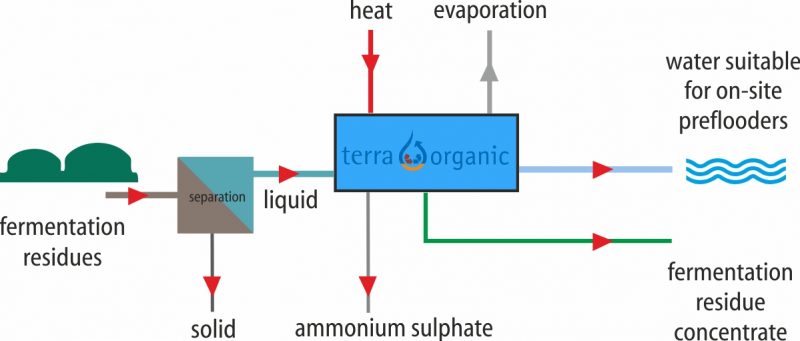Digestate Residue Processing in Biogas Plants
Surface water and silage effluent treatment
Surface water and silage effluent in biogas systems can be comprehensively treated by TerraOrganic in such a way that both receiving water, which can be treated with pre-flood water, and an energy concentrate can be produced for the digester.
Our “TerraOrganic OFW & Bio” product is able to evaporate up to 3,000 m³ of surface water per year. It is also possible to add additional “TerraOrganic OFW” components at any time to double capacity to up to 6,000 m³ per year. This can also be done retroactively.
“TerraOrganic OFW & Bio” is able to handle any level of contamination due to the way the wastewater and distillate are physically separated.
This means the system can continue operating in the biogas plant regardless of any unforeseen circumstances (heavy rain, operating errors, accidents etc.). The water that needs to be fed into the system is automatically quality tested BEFORE the discharge. If the limit is exceeded, it will be returned to the lagoon or storage tank.
We can guarantee inlet conditions that apply to your district irrespective of the degree of contamination of the surface water.
- 100% reduction in surface water and digestate:
NO longer necessary to spread digestate on the fields - Eligible for the CHP bonus
MAXIMUM cost efficiency - Less strain on final storage facilities of digestate residues
INCREASES storage capacity - Guaranteed inlet quality
IRRESPECTIVE of the type of contamination
Processing of digestion residues
- 70% reduction in volumes
REDUCES transport costs - Organic fertiliser which is 100% eligible for credits
ensures fertiliser regulation compliance - Nutrient separation
through the production of various types of fertiliser (ASL, concentrated sludge, etc.) - Eligible for the CHP bonus
MAXIMUM cost efficiency
Diagram:
Digestates and their disposal are one of the greatest challenges that need to be faced when operating biogas plants.
Terrawater has developed its TerraOrganic product range to include a digestate residue processing system which has been adapted to suit the requirements of biogas plants. This integrated and sustainable system is used to separate nutrients and reduce volumes.
This modular system makes it easy to adapt to the most varied conditions that are present in each biogas plant. Parameters such as “available heat” and “digestate residue volumes” are taken into account, as well as “nutrient separation” and “transport cost reduction”.
Benefits Summary:
- Four types of fertiliser are produced:
- A solid top dressing fertiliser
- A concentrated sludge containing phosphate
- An ammonium sulphate solution
- A defined digestate concentrate
- Appropriate and targeted fertilising: The fertiliser can be mixed to suit specific local soil requirements.
- Separating water reduces volumes.
- Heat requirements can be adapted to suit the conditions at the biogas plant.

